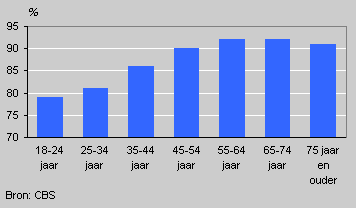Less waste collected separately

Environmental awareness among the Dutch population seems to have dropped in recent years. In 1997 eight in ten people in the Netherlands separated vegetable and fruit waste from other waste, whereas in 2003 only was one in seven did. In 1997 90 percent of the Dutch population took empty bottles to the bottle bank as opposed to 87 percent in 2003.
Separately collected vegetable and fruit waste, 1997–2003

Nine in ten people separate garden waste
Other aspects of environmental awareness do not seem to have changed much. More than nine out of ten inhabitants separate garden waste from other waste and almost nine in ten inhabitants separate waste paper and cardboard. Over eight in ten take chemical waste to special collection stations.
These figures have been fairly stable since 1997.
Older people care more about the environment than young people
Not all groups within the population equally care about the environment. Compared to young people older people more often take empty bottles to the bottle bank, separate vegetable and fruit, take chemical waste to special collection stations and separate waste paper and cardboard. There are virtually no differences between both sexes.
Use of bottle banks by age, 2003

More environmental awareness in rural areas
Environmental awareness is higher in rural areas than in large cities. Eight in ten residents of highly urbanised areas throw their empty bottles in bottle banks. In the country the proportion is more than nine in ten. Only one in three persons in highly urbanised areas separate organic waste against 85 percent in rural areas.
In rural areas more garden waste, waste paper and chemical waste is collected separately than in large cities.
Even if age differences between people living in rural areas and those living in highly urbanised areas are taken into account, the differences still remain.
Separate collection of waste paper and cardboard by urbanisation rate, 2003

Henk Swinkels